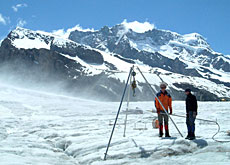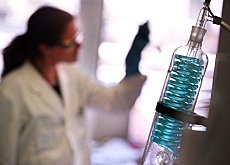Researchers want more state cash

The government should increase spending on scientific research by ten per cent a year to make Switzerland more competitive on the international playing field.
That’s according to the Swiss National Science Foundation (SNSF), which says current funding lags behind the average across the countries belonging to the Organisation for Economic Cooperation and Development (OECD).
Bern spends 0.65 per cent of the gross domestic product on research every year, compared with an OECD average of 0.75 per cent.
The gap is cause for concern for the SNSF, which recently submitted its programme for the period 2008-2011 to the government. It said that last year it had to turn down 45 per cent of grant applications because of a lack of money.
More than 2,000 requests for a total of SFr620 million ($475 million) were submitted in 2005, but only SFr280 million was available for disbursement.
“Despite strict selection criteria, the foundation is not in a position to encourage high-quality research projects,” the SNSF said in a statement.
Record levels
Applications have reached record levels in recent years, says the foundation, a trend that is likely to be replicated in 2006.
However Professor Stéphane Garelli, a competitiveness expert at the IMD in Lausanne, said that overall Swiss spending on scientific research compared favourably with other countries, because of the private sector’s contribution.
“Total spending on research and development in Switzerland is equivalent to 2.57 per cent of gross domestic product – precisely the same level proportionately as in the United States,” Garelli told swissinfo.
Profit
The SNSF says, however, that the private sector concentrates primarily on applied research – seeking profitable products and services – rather than basic research, which may never result in profit but is nevertheless necessary.
“Without strong [basic funding from the state], the private sector will increasingly turn to other nations because our country lacks highly qualified scientists and employees,” said the SNSF’s director, Daniel Höchli.
The SNSF said Switzerland was facing increased competition from other countries in the field of research, particularly from Asia.
“Politicians are fully aware of the growing importance that encouraging research has for Swiss competitiveness but this awareness has not been sufficiently translated into action,” said Höchli.
Nobel prizes
Garelli acknowledged that Switzerland invested less in basic research than do the US, Britain and France, for example – one reason why those countries won the lion’s share of Nobel prizes.
But he said Switzerland had historically relied on industry to do much of its research, and in terms of global research competition the country was today an undisputed world leader.
“Switzerland is currently number two, behind the US and ahead of Singapore.”
In Garelli’s view the level and distribution of funding into research – roughly one-third from the state and two thirds from business – is therefore appropriate for the moment.
He added that the fact the SNSF was obliged to turn away numerous applications for research funding was not in itself a matter of concern, since “what constitutes ‘basic research’ can be difficult to define, and lots of projects inevitably cannot be financed.”
swissinfo
The Swiss National Science Foundation was established in 1952, and has a federal mandate to promote independent research.
Its primary role is to evaluate research proposals from scientists and to fund those that it considers viable and likely to expand knowledge.
The SNSF funds more than 7000 researchers every year, 5000 or more of whom are 35 years old or younger.
It also directs national research programmes, investigating issues ranging from the dangers posed by genetically modified organisms to relations between Switzerland and apartheid South Africa.
The OECD has 30 member countries, including Switzerland.
Average public spending across the OECD members on scientific research was 0.75 per cent of gross domestic product (GDP). A further 1.51 per cent came from the private sector.
In Switzerland the state spends 0.65 per cent with a further 1.92 coming from the business world.

In compliance with the JTI standards
More: SWI swissinfo.ch certified by the Journalism Trust Initiative


You can find an overview of ongoing debates with our journalists here. Please join us!
If you want to start a conversation about a topic raised in this article or want to report factual errors, email us at english@swissinfo.ch.